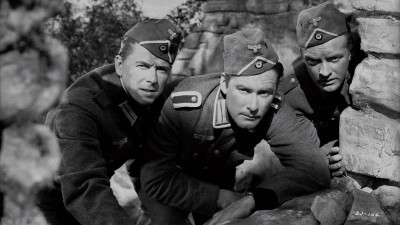
With Election Day rapidly approaching, the Museum of Fine Arts began a new weekly screening program Thursday to recall a certain past presidency.
Ronald Reagan, the 40th President of the United States and a highly acclaimed actor, starred in several Hollywood films before becoming president, playing roles ranging from a secret service agent to a football star. The MFA showcased these roles as part of the “Reagan in Hollywood: The Origins of a Conservative Icon” series, which included a screening of 1942 “Kings Row” on Sunday.
“Kings Row,” Reagan’s favorite role according to the MFA’s website, portrayed Reagan as a spirited, happy-go-lucky ladies’ man with a twist of bad luck that resulted in an unnecessary amputation of both his legs. A role very different from a high-profile politician, it pushed filmgoers to see Reagan in a different light.
“I always thought of him as a politician,” said Chip Boynton, 64, of Needham, an attendee at Thursday night’s screening. “But to see him actually act, he was really believable and seemed really genuine.”
To see Reagan outside his role as a politician helped Boynton and his wife form a more unbiased impression of him, he said.
Others, however, stood firm in their political beliefs.
“It gave me a little more depth of understanding of his role as an actor, but for me, his presidency, which I frankly regret, stands separate from his role as an actor,” said Diane Butkus, 63, of Roxbury Crossing.
A registered democrat, Butkus admitted that she disagreed with many decisions made during Reagan’s presidency and doesn’t remember that time fondly. Though individuals like Butkus may separate Reagan’s life into two distinct halves, the original goal of the film series was to question people’s perceptions of Reagan as a whole.
“I do think Reagan’s experiences in the Hollywood studios inform his political career and his political trajectory,” said Carter Long, the Katharine Stone White Curator of Film and Video at the MFA. “It established him as someone who could be seen as having integrity in the public eye.”
Because Reagan’s presidency has become a popular discussion topic during this election season, Long decided it was important that people understand the artistic side of Reagan in addition to the political one, he said.
This year, it’s easy to think of another candidate without a prior career in politics, but rather in business and television. Donald Trump, whom many initially didn’t consider to be a serious candidate, quickly rose to the top of the polls in a competitive GOP race. He now stands as the Republican candidate for the 2016 presidential election.
Perhaps many voters, desperate to invoke change, find great value in bringing in an outside perspective, Long said. While, of course, there are irreplaceable skills that can only be learned through the process of becoming a politician, he said, it isn’t always so black and white.
“I think there are some experiences, some nonpolitical career experiences that can be of great value to a politician,” Long said.
Similar to Reagan’s, Trump’s career in the public eye began far before he decided to run for the presidency, giving the American community a chance to see him as a human outside politics.
“I think it’s a lot about trust,” said Katherine Irving, the Manager and Assistant Programmer of Film and Video at the MFA. “When people spend that many hours with you on screen, they start to feel like they know you. And I think it’s hard for all of us to separate out acting from real life sometimes.”
Regardless of general public sentiment, Trump burst into the political scene with a strong presence. In 2003, Trump became the executive producer and host of NBC’s reality game show “The Apprentice,” later becoming “The Celebrity Apprentice.” His reputation as a vision of television stardom followed him into the presidential race, pushing attendees of the film series to wonder if there is, in fact, a tendency that voters may sometimes have.
Of course, the MFA Reagan series did not necessarily start out with the goal of pushing people to draw comparisons between past and present candidates. If anything, Long said, he hoped to help the public understand the depth of American political history, to see “where we’re coming from and why we think the way we do.”
With the chance to learn more about past presidencies, it’s important for individuals to take advantage of essential questions, he said.
“It can move them towards more self-awareness and more political awareness,” Long said. “How do we navigate these really strange political times? I think this series can help people work that out for themselves.”


















































































































